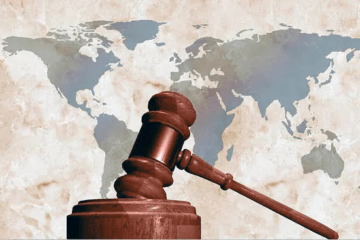
This article is written by Khushi Bansal of 5th Semester of University Institute of Legal Studies, Panjab University, Chandigarh, an intern under Legal Vidhiya
Abstract:
The following article explores information about false confessions. The introduction primarily talks about the importance of confessions in a criminal trial. It further provides a brief about what false confession is and how forensic science plays a significant role to avoid false confession. Moving further, the reader would find the causes and consequences of false confessions, i.e. what all leads to false confessions and what the impacts of the false confession are. Then are the kinds of false confession, followed by the issues of false confession. This section discusses what all concerns are raised due to the making of false confessions. Here, we see that there are several other issues arising out of false confessions. The solutions are also prescribed to solve the problem. Finally comes the conclusion part. Hence, in this article, the issues of false confession are highlighted.
Keywords:
Biasness, involuntary, threat, fear, stress, coercion, force, intellectual incapacity, interrogation, police custody
Introduction:
In the criminal justice system, a confession is believed to be a strong piece of evidence as it is very persuasive and incriminating. The U.S. Supreme Court, in a landmark judgment of Miranda vs. Arizona[1], held that the confessions are “the most compelling possible evidence of guilt.” Furthermore, Saul Kassin in his notable work ‘The Psychology of confession evidence’ mentions that Confession evidence is a “prosecutor’s most potent weapon”. It was a widely accepted view that a person would not confess to a crime that has not been committed by him. In Criminal Interrogation and Confessions (2001) by F.E. Inbau, J.E. Reid, J.P. Buckley, and B.C. Jayne, the authors call it a mere contention regarding false confession that an innocent suspect operating within the normal limits of competency would not accept physical responsibility for an act he knows he did not commit. However, with time passing, this wrong notion has been socially condemned as sometimes it is discovered later on that the confession was a false one. This is how the concept of false confessions got recognition in society.
What is a false confession?
In recent times, numerous media reports have been found where a person, as a result of his confession, was held guilty of a crime he did not commit but exculpated afterward. In simplest words, a false confession refers to the statement of a person where he accepts something which has not been done by him. For instance, A confesses that he has murdered B but in reality, C has murdered B. Here, the statement made by A is a false confession. There may be several reasons behind a person making a false confession, which include either use of force, threat, coercion, undue influence, mental disability or to protect the actual accused from the consequences of their wrongful act. A false confession delays the process of delivering justice and also becomes a hindrance in the justice system.
The advancement in forensic sciences has contributed to the identification of false confessions in a great way. In modern times, the latest techniques like DNA testing, scanning of fingerprints and other biometrics, polygraph tests, using Artificial Intelligence for testing the evidence and other such techniques assist in criminal cases. If these technological developments are used appropriately, the problem of false confession can be solved to a great extent. This ultimately ensures justice and also the reliability of the judicial system. Therefore, these techniques must be incorporated to avoid false confessions leading to wrongful convictions.
Causes and Consequences:
Substantially speaking, no person is ready to confess his guilt, and that too, when he is not even a part of it. An eye witness can make a mistake but an innocent person cannot plead guilty when he is not at fault. However, innocent people make false confessions sometimes and consider themselves as the offender. Most often, this is done out of threat, stress, force, or coercion, either by police and authorities or by the actual wrongdoer. Richard Leo, an expert on false confessions recognizes three main reasons for making a false confession which are as under[2]:
- Misclassification of error, i.e. when police erroneously decide that the suspect is the guilty person and interrogates accordingly.
- Coercion error, i.e. when police use some maneuvers (like misguidance or torture) to make the suspect give a false confession
- Contamination error, i.e. when the interrogators pressurize the suspect to simply settle for a selected account leading to contamination of the suspect’s narrative.
Due to the above-stated reasons, the accused makes the false confession harming the delivery of justice as a confession is considered a strong piece of evidence. It leads to hindrances in the working of the judicial system. The rights of many people are violated, including the rights of the accused. The reliability of the judicial system comes into doubt. Police are also viewed with a negative perspective. A false confession results in a wrongful conviction that is completely against the principles of criminal law. In short, it can be said that a false confession makes an adverse impact on the judicial system, the suspect, and society as a whole.
Kinds of false confession:
The social psychologists Saul Kassin and Lawrence Wrightsman, in the year 1985, classify three types of false confession, i.e. Voluntary false confessions, Coerced-compliant false confessions, and Coerced-internalized false confessions. Later, of she and Leo extended this classification and made five distinctions of false confession: voluntary, stress-compliant, coerced compliant, coerced-persuaded, and non-coerced persuaded. Finally, keeping in mind the simplicity, the researchers have merged these five kinds of false confessions into three. These include voluntary false confessions, compliant false confessions, and persuaded false confessions. Each one is described briefly as under[3]:
- Voluntary false confessions-
A voluntary false confession is a confession that is offered in the absence of any prompting by police officers or in the absence of any external pressure. It is generally the result of an underlying mental disturbance or a psychiatric disorder an intellectual incapacity. The most common reason for voluntary false confessions is to protect the real culprit from punishment, mostly his family member, relative, or friend, to secure participation in another crime. A false confession may also be due to the reason that an intellectually weak person is not able to figure out the circumstances and reality of the case.[4]
Case Law: The Lindbergh Kidnapping Case (1932) [5].
- Compliant false confessions-
A compliant false confession is generally given once the interrogation gets over when the accused is in police custody in a scary and stressful environment. When the authorities use threat, coercion, force, stress, or pressure, the accused gets nervous and makes a false confession which we call a compliant false confession. The authorities also try to convince the accused that he shall be availed during the trial or the court would not give a harsh punishment if he confesses his guilt.
Case Law: The New York Central Park Jogger (1989)[6]
- Persuaded false confessions-
Persuaded false confession occurs when the police use such tricks and tactics while interrogation that it makes an innocent suspect doubt his memory and think that he might have committed the offence. As a result of such behavior of the interrogator, when the person confesses to any wrongdoing, he may also try to provide false evidence(s) to support the commission of a crime. This is because he honestly believes that he might have committed the offence. The human nature of anxiety and fear makes the suspect ponder about his actions and he accepts his guilt in the commission of an offence.[7]
Issues of false confessions:
The false confessions in international law raise worries related to the fair trial, the human rights of the suspect, eroding trust in the judicial system, wrongful convictions, social impacts, and a few other concerns. Some of the main issues raised due to the false confessions are[8]:
- Fair trial
Article 10 of the Universal Declaration of Human Rights (UDHR) and Article 14(1) of the International Covenant on Civil and Political Rights (ICCPR) explicitly mention the provision of fair trial. Every person has the right to a fair trial, as mentioned in the aforementioned articles. However, making false confessions violates this right of the suspect. The innocents are made to falsely confess, with the use of force, threat, or manipulation, a crime that they have not even committed. They do not get a fair chance to represent themselves in a court of law.
- Rights of the accused
Rome Statute of the International Criminal Court provides certain protections to the accused person. For instance, Article 67 mentions the rights of the accused. These rights include the right to provide a defense and not to be compelled to confess their guilt. When a false confession is made, the provisions of this statute are badly affected.
- Torture by the authorities
Most often a false confession is a result of force, threat, or coercion by the authorities. The police use the torture method, physical or mental, during the interrogation to make a person confess his guilt, even if he is not the actual offender. The Convention against Torture and Other Cruel, Inhuman or Degrading Treatment or Punishment strictly prohibits such practices of torture. Moreover, Article 5 of UDHR also stands against torture or cruel, inhuman or degrading treatment or punishment.
- Criminology Principles
There is a well-known principle of criminal law stating that every person must be presumed innocent until proven guilty. Intending to have a false confession, the police act in the opposite way. It presumes the person to be guilty, even in situations where there are no chances of the person being guilty. This is against the main principles of criminal law.
- Human Rights
There are certain human rights, which are available to every citizen, including the accused. For instance, Article 1 of UDHR recognizes the freedom, equality and dignity of every individual. Furthermore, Article 3 provides the right to life, liberty and security. In cases of false confessions, these basic human rights are taken away from the suspected persons. Undoubtedly, there are several reasonable restrictions on the rights but the restrictions on the rights of the suspects are beyond the extent of “reasonable” and that too when the person is not at fault.
- Image and reputation
Article 12 of UDHR is a protection against the attacks upon honour and reputation of a person. It also prohibits arbitrary interference with privacy, family, home or correspondence. But when an innocent person is forced to make a false confession, the image and reputation are stained. Society views the person as an offender.
- Impact on victims
The issue of false confessions diverts attention from the main point of concern, i.e. delivering justice to the victim. It is no less than denying justice to the victim. Or it can also be said that it is a mere compounding between the actual offender and the victim. The sufferings of the victims and their families are not accurately compensated.
- Wrongful Convictions
A false confession results in wrongful convictions, i.e. an innocent person gets convicted for the wrong of some other person. It is a gross miscarriage of justice and is unacceptable in the eyes of law and society. This raises a major concern relating to false confessions as wrongful convictions further result in extreme injustice with the person wrongfully convicted.
- Systematic issues
False confessions and wrongful convictions altogether highlight systematic faults, like an unfair trial, poor representation of the accused, uncontrolled arbitrariness of the authorities, absence of legal safeguards against false confessions, etc. Numerous international provisions put an obligation on the states to look into the matter and take action against false confessions. But the continuing problem poses a question about the incapacity of the states to protect their citizens from arbitrary false confessions.
Solutions and improvements[9]:
- Stringent statutory provisions
The legislative bodies of the states or the international organizations shall take up the responsibility to make the most stringent laws to avoid unlawful confessions. There must be provisions to ensure that the confession was a genuine one or a false one.
- Better enforcement of laws
There are certain laws and statutes to ensure fair trial but do not expressly mention the issue of false confessions. But if we observe closely, false confessions can be interpreted to be a part of a fair trial. Thus, proper enforcement of the already existing laws is required.
- Suo motu action by the judiciary
The judicial bodies of several states have the authority to take suo motu actions on various issues that are often ignored by the legislature and executive branch of the government. The courts must become more active in taking strict suo motu actions against false confessions.
- Recording of the interrogation process
Most of false confessions are due to the methods of threat and coercion used by the police during the interrogation process in police custody. The arrangements shall be made for recording the whole interrogation to ensure that the interrogation is not being made arbitrarily. This also establishes the transparency and accountability of the interrogation in police custody.
- Check on the interrogator
Neither there is supervision on the interrogation process, nor the interrogator. There shall be a supervisory and superior body to keep a check on the police and interrogators to check that there is no coerced false confession in the name of interrogation. With this, the monopolistic nature of interrogators would also come to an end.
- Cross-checking of confessions
The courts must make sure that the confession is not a false confession. If it is due to the force or threat by the authorities, then an investigation must be arranged to collect the right information. In case the confession is due to a mental disorder or intellectual incapacity, the courts must adopt the appropriate procedure, based on the facts and circumstances of the case, to come out with the truth.
- Better training for personnel
The personnel for interrogation shall be trained. They must be trained in interrogation techniques, so that they are well acquainted with the prescribed method of interrogation, adhering to the human rights standards. They must be taught the principles of criminal law and justice to make them realize the cons of a false confession in a fair trial and delivery of justice.
- International strategy
Since this is a serious issue, all the nations shall come together for an unbiased interrogation to prevent involuntary false confessions. A strategic framework, with the cooperation of all the States, is necessary to solve the issue of false confessions on an international level. Some strong international bodies like United Nations shall come to the forefront and take the initiative to tackle the problem. International planning to combat the situation of unfairness and biased interrogation would resolve the issue faster than independent policies of the States as the latter one is time-consuming and also requires more resources.
It is quite important nowadays that the issue of false confessions comes into the limelight, which is being frequently ignored by national and international bodies and organizations. With time passing, the number of false confessions is getting increased.
Conclusion:
In light of the above discussion, it is beyond doubt that false confessions cause incredible harm to the innocent. The whole justice system is turned upside down with a false confession. Therefore, it becomes important to examine the confession and verify if it is a false confession. In case it turns out to be a false confession, the confession must not be trusted and the interrogation shall be conducted again with proper methods and techniques, as prescribed. But it is quite challenging as the issue of false confessions is unable to get the required attention and concern. It requires vigorous effort and constant analysis of the situation. Though international law provides the right to a fair trial, the concern of false confessions is still a neglected one. So, the primary task is to divert some attention to the aforementioned issue. Then there must be reforms in international law that would ensure a fair trial, without any false confessions, whether voluntary or involuntary. It is high time that international law needs to address this very global issue. Otherwise, the day is not far when the condition would be at its worst and the innocent would be subject to wrongful convictions in a huge number. Justice would be seen nowhere if the issue of false confession remains unsolved.
[1] Miranda v. Arizona, 384 U.S. 436, 467 (1966)
[2] Rida Zaidi, All you need to know about false confession, ipleaders, available at https://blog.ipleaders.in/all-you-need-to-know-about-false-confession/#Causes_of_a_false_confession, last seen on 12 August, 2023
[3] Diksha Bhalla, False Confessions Analysis, Volume 4-Issue 5 | International Journal of Law Management and Humanities | 973, 976-977 | (2021), available at https://doij.org/10.10000/IJLMH.111726, last seen on 10 August, 2023
[4] Rida Zaidi, All you need to know about false confession, ipleaders, available at https://blog.ipleaders.in/all-you-need-to-know-about-false-confession/#Kinds_of_false_confessions, last seen on 12 August, 2023
[5] Two babies were kidnapped and later found dead. It was found that the culprit was forced to write similar notes to the ransom notes by the police. Consequently, he was hanged to death.
[6] Four teenagers were presumed to be rapists and on this suspicion, they were arrested. But it was found later that they were innocent owing to their statements. Also, their DNA reports did not match that of the woman.
[7] Supra 3 and Shaista, False confession and the Way of dealing with them in Different Countries, Legal Service India, available at https://www.legalserviceindia.com/legal/article-11953-false-confession-and-the-way-of-dealing-with-them-in-different-countries-.html, last seen on 15 August, 2023
[8] Pallavi Kumari, The Issue of False Confession in international Law, Legal Vidhiya, available at https://legalvidhiya.com/the-issue-of-false-confession-in-international-law/, last seen on 16 August, 2023
[9] Ibid.




0 Comments